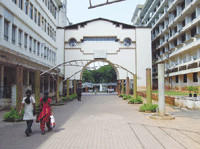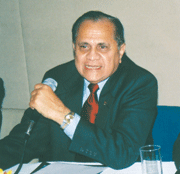A wave of indignation swept — and is continuing to perturb — the tiny campus town of Manipal (pop.30,000), the epicentre of the Manipal Education Group (MEG), India’s largest private sector transnational higher education service provider, and particularly well-reputed internationally for the high quality medical education it offers in India and affiliated campuses abroad. On September 1, in its prime time 9 p.m bulletin, the Delhi-based television news channel CNN-IBN informed its claimed 60 million national viewers that the country’s pioneer private sector Kasturba Medical Colleges (KMC) in Manipal and Mangalore (estb. 1953), have been derecognised by the Union government’s department of health and family welfare on the recommendation of the Medical Council of India (MCI) for having admitted far greater number of students than permitted by MCI norms.
According to the CNN-IBN report, KMC has exceeded the permitted MCI norm (calculated on the basis of faculty employed and teaching-learning infrastructure installed) by a multiple of three by admitting 750 students against its sanctioned capacity of 250 students this year.
 Manipal University sources allege the charge against KMC, which is regularly ranked among the top 10 medical colleges in the annual surveys of India Today and Outlook, is rooted in the latter’s against-the-odds success in establishing itself as a highly reputed transnational provider of medical education. In 1994 after KMC had trained and contributed an astonishing 25 percent of all medical practitioners in Malaysia over a span of three decades, MEG was invited by the government of Malaysia to establish a twinning programme with the Melaka Medical College under which Malaysian students would enroll for two-and-half years study in KMC, and complete their five-year MBBS degree programme in Melaka Medical College. The signing of the MoU (memorandum of understanding) between KMC-Melaka Medical College was witnessed by then prime ministers of India and Malaysia (Narasimha Rao and Dr. Mahatir Mohammed), and was sanctioned by the Union health ministry in a letter dated July 19, 1995.
Manipal University sources allege the charge against KMC, which is regularly ranked among the top 10 medical colleges in the annual surveys of India Today and Outlook, is rooted in the latter’s against-the-odds success in establishing itself as a highly reputed transnational provider of medical education. In 1994 after KMC had trained and contributed an astonishing 25 percent of all medical practitioners in Malaysia over a span of three decades, MEG was invited by the government of Malaysia to establish a twinning programme with the Melaka Medical College under which Malaysian students would enroll for two-and-half years study in KMC, and complete their five-year MBBS degree programme in Melaka Medical College. The signing of the MoU (memorandum of understanding) between KMC-Melaka Medical College was witnessed by then prime ministers of India and Malaysia (Narasimha Rao and Dr. Mahatir Mohammed), and was sanctioned by the Union health ministry in a letter dated July 19, 1995.
Subsequently in 2006, a similar twinning arrangement was signed between the University of Antigua (West Indies) and Manipal University, which was ratified when Baldwin Spencer, prime minister of Antigua met with Dr. Manmohan Singh last year. According to MEG sources, during his meeting with the visiting prime minister, Dr. Manmohan Singh singled out the twinning arrangement between the two universities as a notable example of international education cooperation and acknow-ledged the “stellar reputation” of KMC.
More to the point, the KMC management seems to have made adequate infrastructure and faculty provision for students from these two foreign institutions in Manipal. “Both the Manipal and Antigua twinning programmes have their own separate infrastructure and faculty at Manipal, and are independent of KMC. Hence they do not violate any regulatory stipulations,” wrote Dr. Ramdas Pai, chancellor of Manipal University, in a detailed and anguished undated letter to the parents of the 2,500 Indian students of KMC.
With the outbreak of a major row and following the unexpectedly strong reaction of the MEG management, the ministry sent teams of inspectors to survey the KMC campus in May and June. Inevitably, given that KMC, unconstrained by limitations of space, has built a model campus which by common consensus within the country’s medical fraternity is among the finest and best managed medical education facility in India, the inspection teams were unable to contradict the separate facilities claim of the MEG management.
Therefore to save face, in their report, the inspectors raised several trivial objections typical of the notorious inspector raj regime which harasses Indian industry. Among them: alleged failure to provide separate hostel facilities for foreign medical students; running a dental college not “fully recognised” by the Dental Council of India; permitting faculty to travel abroad for teaching; using government hospitals for clinical training; and other minor infringements of omnibus MCI regulations.
 “In MEG institutions and KMC in particular, we take pride in complying with government regulations prescribed in the public interest. Therefore even though we believe that our facilities are compliant, we have taken steps to accommodate the latest objections of the inspectors. Thus although it is general practice worldwide for students of all communities and races to share hostels, we have agreed to provide separate blocks for foreign students. However since we established our dental colleges in 1965 and 1987 with the full approval of the Dental Council of India and the Union government, we can’t comply with this objection. Likewise we were given permission without pre-conditions to use the government hospital in Mangalore for clinical trials way back in 1955. Therefore we don’t see any merit in this objection either. If for these reasons the medical degrees of Manipal University are derecognised, it will result in grave injustice to our students,” says Pai.
“In MEG institutions and KMC in particular, we take pride in complying with government regulations prescribed in the public interest. Therefore even though we believe that our facilities are compliant, we have taken steps to accommodate the latest objections of the inspectors. Thus although it is general practice worldwide for students of all communities and races to share hostels, we have agreed to provide separate blocks for foreign students. However since we established our dental colleges in 1965 and 1987 with the full approval of the Dental Council of India and the Union government, we can’t comply with this objection. Likewise we were given permission without pre-conditions to use the government hospital in Mangalore for clinical trials way back in 1955. Therefore we don’t see any merit in this objection either. If for these reasons the medical degrees of Manipal University are derecognised, it will result in grave injustice to our students,” says Pai.
Quite clearly there’s more than meets the eye in MCI targeting KMC. According to EW sources in Delhi, this is the fallout of the MEG management failing to genuflect and “sufficiently accommodate” MCI and Union health ministry officials. With its large number of foreign students and transnational operations, MEG is regarded as a rich cash cow for shakedown experts in Delhi. But given the preference of the MEG to stick to the rules and/or resort to the courts, the CNN-IBN telecast was a clever plant to smear the reputation of KMC.
Meanwhile despite the damage it has done to KMC’s sterling reputation by telecasting its unverified report (in which the word “alleged” was not used), CNN-IBN has not publicly retracted. Several calls made by this publication to Rajdeep Sardesai, chief editor of the news channel, were not returned. A right royal battle in the courts could be imminent as the MEG management — well known for initiating legal slugfests — moves to defend its hard-won reputation.
Dilip Thakore (Bangalore)